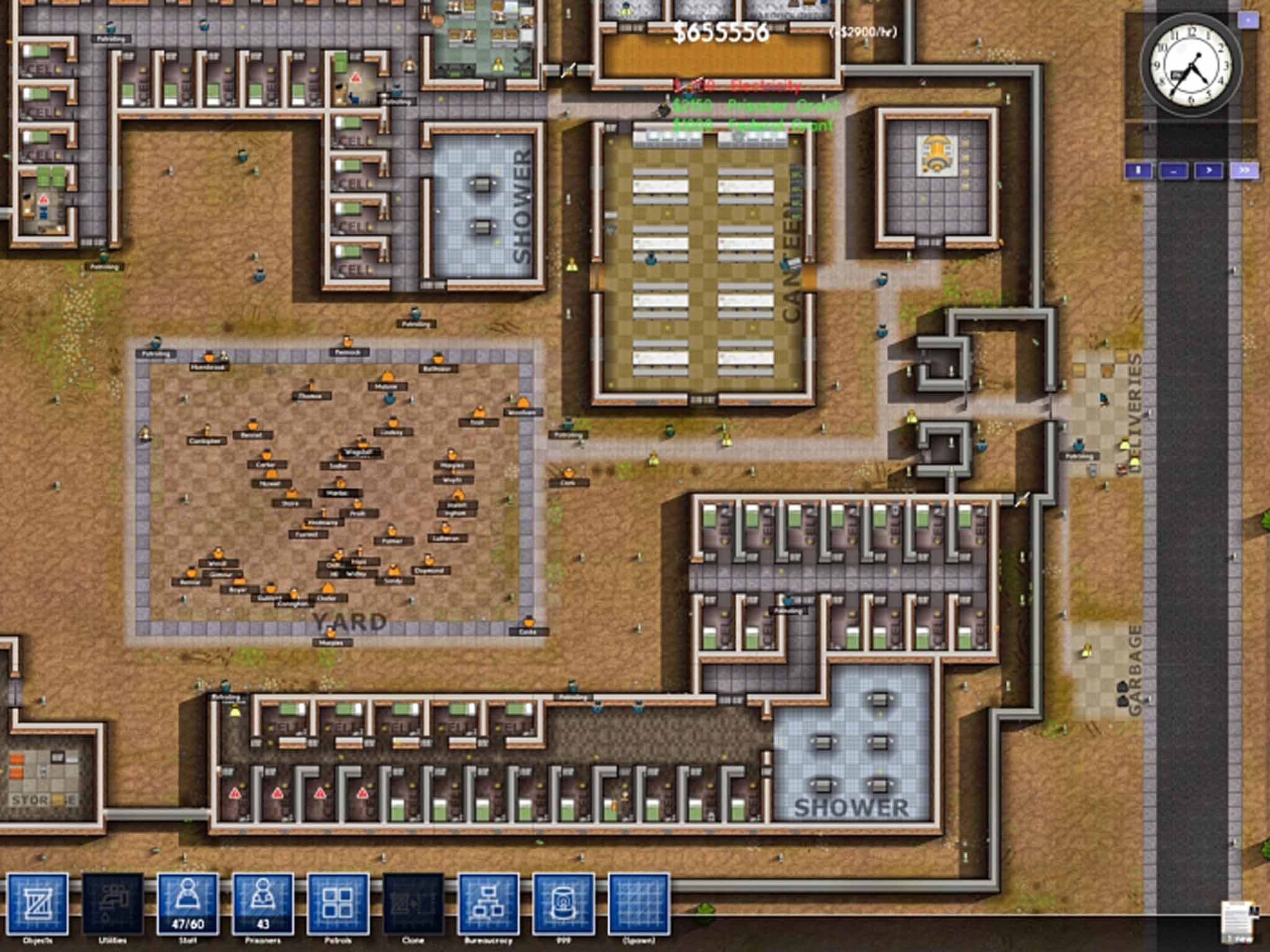'Prison Architect': A clever way of exploring how the penal system is run or an ethical offence?
'Prison Architect' allows players to build and run their own jails. Rhodri Marsden reports.

Your support helps us to tell the story
From reproductive rights to climate change to Big Tech, The Independent is on the ground when the story is developing. Whether it's investigating the financials of Elon Musk's pro-Trump PAC or producing our latest documentary, 'The A Word', which shines a light on the American women fighting for reproductive rights, we know how important it is to parse out the facts from the messaging.
At such a critical moment in US history, we need reporters on the ground. Your donation allows us to keep sending journalists to speak to both sides of the story.
The Independent is trusted by Americans across the entire political spectrum. And unlike many other quality news outlets, we choose not to lock Americans out of our reporting and analysis with paywalls. We believe quality journalism should be available to everyone, paid for by those who can afford it.
Your support makes all the difference.Paul Austin is 39 years old. Five years ago, he was sentenced to 11 years in prison after being found guilty of false imprisonment. Austin's 62-year-old mother and 67-year-old father are due to visit him in the next few hours, but it's a bad time for Austin. He's unhappy with the prison regime and in recent weeks he hasn't been afraid to show it. Solitary confinement appears to have had little effect on him.
But what he doesn't know is that in 10 minutes' time, he's going to lose it completely when he discovers that I've had the pool tables and the televisions removed from the prison's leisure facility. Just on a whim. Ha! He's going to go ballistic!
Fortunately for human-rights campaigners everywhere, I'm not in charge of a real prison, and Austin is a mere sprite, about 40 pixels square, mooching around a canteen full of dirty trays and other disgruntled prisoners. The game in which he features, Prison Architect, has become quietly massive; it's still to be officially launched, but since September 2012 it has sold more than a million copies of the alpha version at $30 each, lavishly funding its development and netting Introversion Software, a British software house based in Walton-on-Thames, a small fortune.
It's been heralded as a masterpiece of the construction and management simulation (CMS) genre, which extends back to 1981's real-time strategy game Utopia and includes classics such as SimCity (1989) and Civilization (1991). The sheer complexity of the game is astounding: as well as constructing impenetrable prison walls from a range of hardy materials, you've got to think about plumbing in showers, installing metal detectors (to stop families smuggling stuff in on visits), providing facilities to let the guards rest, deciding how to punish inmates if they violate rules, and so on. The opportunities for micro-management of the facility are limitless, and each comes with advantages and disadvantages. But every decision you make seems to involve some kind of moral judgement.
Nowhere is this made clearer than in the game's introduction, where the prison's chief executive (who bears a startling resemblance to the President of Sinn Fein, Gerry Adams) calls you with an urgent instruction to build an execution chamber in preparation for the arrival of a double murderer, Edward Romsey. "It's not our place to decide if he deserves this," the boss says. "The law has made that decision. We're just here to do a job." Your task – to make the mundane preparations for an execution – dumps you in the moral deep end, and it hasn't sat well with everyone.
"The whole thing has put a terrible taste in my mouth," reads one post on the Steam community message board, "and it's only the insistence from several of my friends that the game itself is pretty good [that's stopping me] requesting a refund." Introversion, for its part, is very aware of the issues it's raising, and has responded regularly and openly to critiques. "We're not aiming to make the player deeply uncomfortable," said the game's designer, Chris Delay, in an interview with Eurogamer, "but we're certainly not going to make a game about prisons without dealing with a lot of the issues that occur in prisons."
Do you spend money on cell windows, or keep prisoners in the dark? How much do you budget for food? Will the prisoners riot in the canteen and take a cook hostage if you reduce portion sizes? And if you're keeping them on the verge of hunger, is there really any point spending cash on implementing an education-reform programme? These are tough decisions for a simpering liberal like me. Other players, however, believe that the moral aspect is overstated. "It's about making an efficient prison, end of story," one fan says on Reddit. "Then getting bored," adds another, "locking your prisoners in the yard, then holding a mass execution when they riot." Ah. Maybe I'm playing it wrong.
The game, inspired by a visit Delay made to Alcatraz, has been a triumph for the company and its other two directors, Mark Morris and Tom Arundel; after years of ups and downs, producing critically acclaimed titles (Darwinia, Defcon) but suffering financial setbacks along the way, they finally have a proper hit on their hands. And while it may involve typical gaming themes of violence, crime, cruelty and death, it's unique in the way it forces the player to consider why those things may be happening. But now, if you'll excuse me, I've got some prisoners who need restraining.
Join our commenting forum
Join thought-provoking conversations, follow other Independent readers and see their replies
Comments